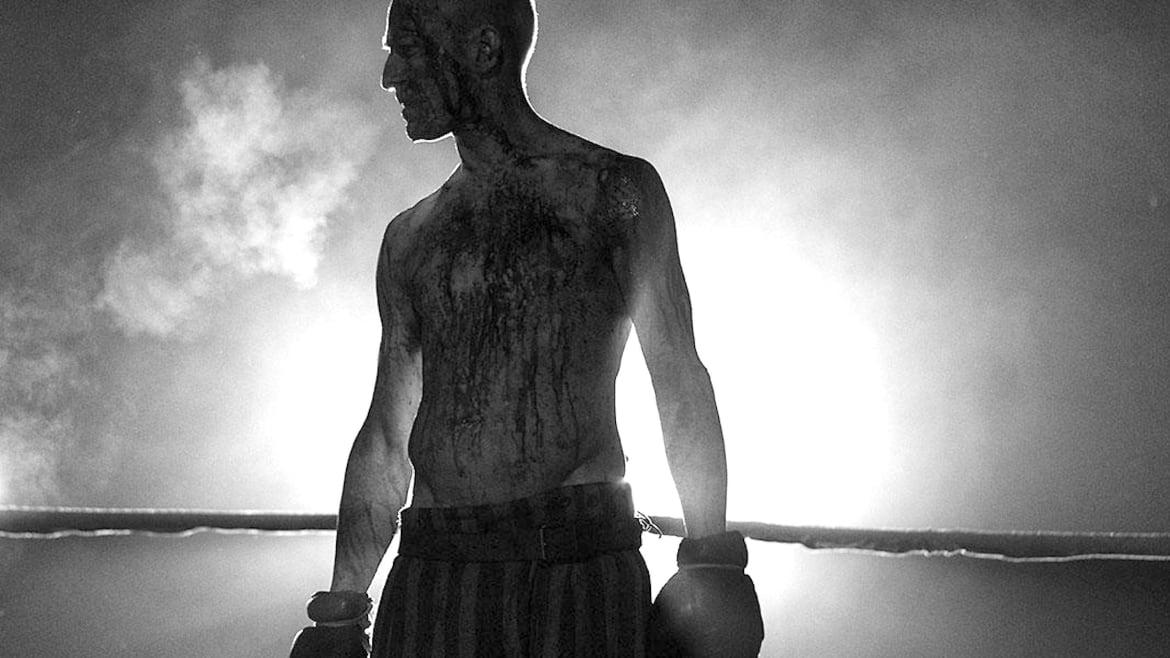The Holocaust ‘Survivor’ Who Boxed to Stay Alive

- Oops!Something went wrong.Please try again later.
In an inadvertently comical scene around the halfway mark of The Survivor, a journalist played by Peter Sarsgaard remarks to Harry Haft—the film’s protagonist, a real-life Auschwitz survivor who was forced to fight fellow prisoners—that, “Nothing is black and white: the sweet spot of a true story is the cracks, the common ground between Jew and Nazi.” It’s not entirely clear to what extent this is supposed to serve as the film’s own modus operandi, but it’s pretty funny that the line appears in a film where the concentration camp flashbacks are presented in solemn black and white.
The Survivor’s story is told in two distinct parts. One is set in post-war America, where the boxer Harry Haft (Ben Foster, with a creaky accent and something prosthetic going on in his facial area) is vying to fight Rocky Marciano, hoping to garner enough publicity to reconnect with his lost love, Leah. The other portion is set during the war, where Herschel Haft’s talent for pugilism is noted by a concentration camp officer (played by Billy Magnussen, with a ripe German accent straight from the Monty Python playbook). It is Haft’s ability to fight—indeed, to destroy his fellow inmates—that will ensure his survival of Auschwitz: this is the traumatic and morally ambiguous past that haunts Harry as he tries to settle in the United States.
The Survivor has a great deal of story to tell, and the film needs to have a moral and psychological compass of extraordinary reach in order to give us an understanding of this man’s story. Unfortunately, the film takes a few shortcuts along the way, particularly in its presentation of scenes set in Auschwitz. Here, Nazi officers are presented with rote “German” accents when speaking in English but occasionally revert to actual German in order to showcase their true evil, such as when they shout “Jew animal” at Haft while he fights. This is both a cliché and a crutch, obviating the need to think about evil in nuanced terms and reverting to a kind of xenophobia based on the sounds of the German language. The film deepens this portrayal with slow-motion lensing, and with heightened sound design during the brutal fights between Haft and his fellow prisoners. These punches sound patently absurd—this is the stylized punching sound made by fighters during action scenes in modern films, not the much more blunt and terrifying sound of actual thumps landing. It feels wrong that the film would over-egg these scenes for drama.
The Inside Story of Thailand’s Daring Cave Rescue
Back in the modern world, Barry Levinson’s drama manages a little more shading, aided by a performance from Ben Foster that occasionally relaxes into recognizable humanity. For too much of the film, his depiction of Haft is a collection of mannerisms, accent, tics, prosthetics, and voice-work, with the sort of freighted anguish that traditionally performs well during Oscar season. There are shades of Robert De Niro here—a kind of SNL De Niro—in the way Foster performs so much bigger than everybody surrounding him. In comparison with the more delicate work done by Vicky Krieps in the role of the woman who listens to Haft’s story and will eventually marry him, Foster’s performance is enormous. Krieps’ lilting mid-European tones also have the unfortunate effect of making Foster’s put-on accent seem all the phonier. But at times, the pair manage to create something more authentic, and there are sweet scenes of the two of them, whose courtship is so stumbling and natural, walking together by a picture-postcard 1950s beach. The reconstruction of the period is solid throughout, and there is something heartening in seeing the sheer financial means at the movie’s disposal in recreating this era.
But too often The Survivor takes the easy way out, such as in its depiction of African-American people—friends of Haft from boxing, who engage him on the topic of persecution in ham-fisted ways. The screenplay is far less successful at landing this weightier material than it is at picking up on believable, charming detail: the scene of Haft thinking about Black and Jewish commonalities ends with him accidentally eating pork, whereupon he remarks, “It doesn’t matter—God doesn’t notice what I do.” This is nice writing, because it gives a sense of character and throws the film’s themes into relief without sledgehammering the viewer.
The Survivor is overall a fairly classy mid-budget package that tells its story with laudable commitment from all parties. Still, it’s striking that clichés to do with trauma, masculinity, violence, and—most importantly—the Holocaust, are still so unresolved, so unchallenged. Far too often, The Survivor is unwittingly funny, which—in this reviewer’s opinion—a film about surviving concentration camps by becoming a collaborator in your fellow people’s suffering probably shouldn’t be.
Get our top stories in your inbox every day. Sign up now!
Daily Beast Membership: Beast Inside goes deeper on the stories that matter to you. Learn more.

